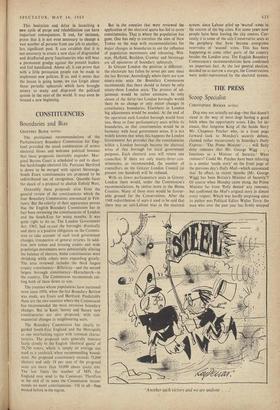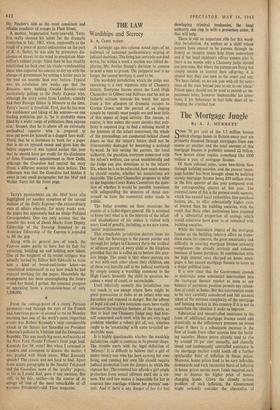CHRISTOPHER BOOKER writes: Dog may not actually eat dog—but that
doesn't stand in the way of most dogs having a good bitch when the .opportunity arises. Like, for in- stance, that longtime King of the Inside Story Mr. Chapman Pincher who, in a front page forward look to Monday's security debate, claimed rather mysteriously in Saturday's Daily Express: 'The Prime Minister . . . will flatly deny rumours that Mr. George Wigg . . . functions as a Minister of Security.' What rumours? Could Mr. Pincher have been referring to a similar 'inside story' on the front page of the previous day's Daily Mail—which announced that 'In effect, in recent months [Mr. George Wigg] has been Britain's Minister of Security'? Of course when Monday came along, the Prime Minister far from 'flatly denied' any rumours, but confirmed the Mail's original story in almost every respect. Which was hardly surprising since its author was Political Editor Walter Terry, the man who over the past year has firmly usurped 'Another such victory and we are undone . .
Mr. Pincher's title as the most consistent and reliable producer of scoops in Fleet Street.
A modest, bespectacled forty-year-old, Terry first really showed his talent for the dramatic revelation in July, 1962, when, supposedly as the result of a piece of genial indiscretion on the part of R. A. Butler, he was able by premature dis-
closure of straws in the wind to precipitate Mac- millan's cabinet purge. Since then he has steadily established his lead over his rivals—confounding those who expected his sources to dry up with the change of government by setting a hotter pace in the past six months than ever before. Typical was his revelation two weeks ago that the Russians were holding Gerald Brooke—and particularly galling to the Daily Express who, although the story came from London, actually had their Foreign Editor in Moscow at the time. Terry's 'secret' is threefold. First, that he has won the confidence and liking of his sources—as one leading politician put it, 'he is probably more liked by a wider range of politicians than anyone else.' Second, that he is above all an extremely methodical reporter who is prepared to nose out news for himself as a dogged 'lone wolf.' Third, that he is fortunate to work for a paper that is on an upward sweep and gives him the fullest support—it was typical earlier this year that he should have got credit for his disclosure of John Freeman's appointment to New Delhi, although the Guardian had carried the story (from a different source) two days before. The difference was that the Guardian had hidden it away in two small paragraphs; but the Mail and Walter Terry led the front page.
Terry's pyrotechnics on the Mail have also highlighted yet another symptom of the current malaise of the Daily Express—the extraordinary state of affairs whereby, for many weeks now, the paper has apparently had no titular Political Correspondent. One can only assume that the transfer this week of Derek Marks from Deputy Editorship of the Evening Standard to an Associate Editorship of the Express is intended to fill the gap.
Along with its general loss of touch, the Express seems partly to have lost its flair for attracting, building up and holding new talent. One of the brightest of its recent refugees was actually invited by Editor Bob Edwards to write him a kind of bread-and-butter letter—an 'unsolicited testimonial' to say how much he had enjoyed working for the paper. Meanwhile the management has been contemplating the future —and has faced, 1 gather, the eventual prospect of operating from a circulation-base of only 3,500,000.
*
From the vantage-point of a sunny Parisian pavement—and through the eyes of the French and American press—it seemed to me on Monday morning that one of the week's more important events was Robert Kennedy's very considerable attack in the Senate last Saturday on President Johnson's policies in Vietnam and the Dominican Republic. This was surely big news, well worthy of the New York Herald Tribune's front page lead. Kennedy for '68, even? But when I returned to London and attempted to discuss the matter, I was greeted with blank stares. What Kennedy speech? The reason was not hard to find. Apart from scanty paragraphs in the Sunday Telegraph and the Guardian, none of the 'quality' papers, as far as I could find, gave it any mention. But still, to be fair, neither—in the course of its eulogy of 'one of the most remarkable of all wartime Presidents'—did Time magazine.



































 Previous page
Previous page